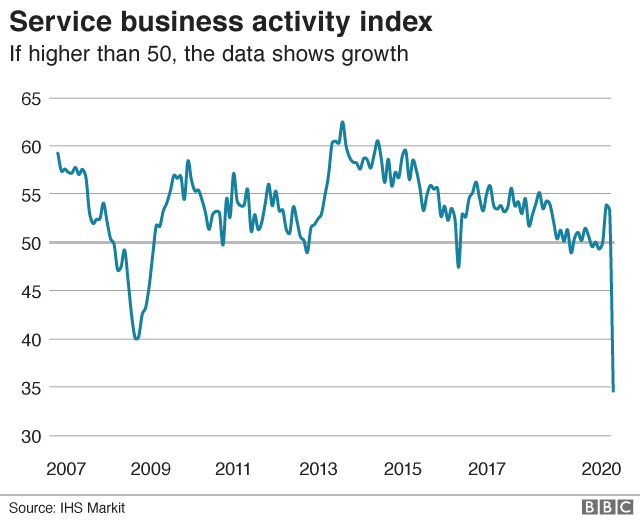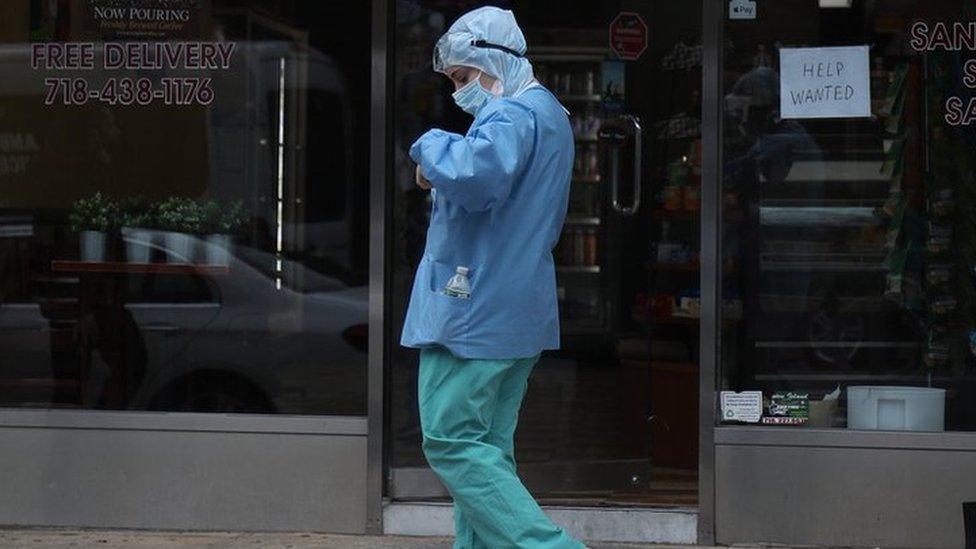Coronavirus: UK among economies risking record slump
- Published

The coronavirus pandemic could trigger a global slump bigger than the Great Depression of the 1930s, a closely watched international survey suggests.
Manufacturing and services sectors in key geographical areas, including the UK, US and the eurozone, saw record falls in activity during March, according to Purchasing Managers’ Index data.
The UK figure, dropped from 53.0 in February to 36.0 in March.
Readings below 50 indicate contraction.
The data is published by IHS Markit and the Chartered Institute of Procurement and Supply (CIPS).
'Devastation'
Andrew Wishart, an economist at Capital Economics, said the PMIs were probably underestimating the scale of the economic fallout.
"We are forecasting a 15% fall" in economic output in the period from April to June, he said, "a larger fall in output than in the financial crisis or the Great Depression," he said.
"It’s increasingly difficult to find the words to describe the devastation as every region in the world fights to save human life as the first priority,” said Duncan Brock, CIPS group director.
“The likelihood of a global recession is now a given, though its duration and severity has yet to reveal itself.”

The composite figure for the manufacturing and services sectors in the eurozone was even worse, down from 51.6 in February to 29.7.
“Confidence about the future was the lowest recorded by the survey since data were first available in July 2012,” said IHS Markit.
“The four largest nations covered by the survey all registered record declines in activity, with Italy and Spain experiencing the sharpest reductions.”
'Worse to come'
Samuel Tombs at Pantheon Macroeconomics said the Italian and Spanish figures showed the slump might worsen in April, when the level of infections is expected to peak in those countries.
As for the UK figures, he said: "In one line: horrendous, and probably not reflecting the full devastation."
The comparable figure for the US hit a new low of 40.9 in March, down from 49.6 in February.
Chris Williamson, chief business economist at IHS Markit, said: “The policy response to the economic damage from the virus has already been unprecedented, but the collapse in business expectations for the year ahead tells us that companies are expecting far worse to come.
“IHS Markit is now forecasting an around 5.5% contraction of US GDP in 2020.”

In normal times, these figures would be top of the news - a frightening warning of impending economic disaster. Purchasing managers - senior managers in companies who keep across what's happening to a company's orders and buy its supplies - see before anyone else if business is drying up.
This chart speaks for itself, adding to evidence from the scale and suddenness of the job losses and benefit claims all around the world. Looking purely at the economic effect on orders and jobs, it is no exaggeration to say that the impact of the Covid 19 shutdowns around the world is now like the Great Depression - but on speed.
And what is most extraordinary is that, from one perspective, that awful-sounding thing is a success for government policy. By ordering shutdowns to try and save lives, our government and others around the world have also ordered a reduction in economic activity unprecedented in its speed and depth. They have required, instructed and requested a huge recession - and they have got one.
Let's hope when the shutdown's lifted and governments want a bounce-back, that they again get what they wish for.
It's all another sign that the Covid 19 crisis is turning everything - environmental, social and economic - on its head.

- Published23 March 2020

- Published3 April 2020
